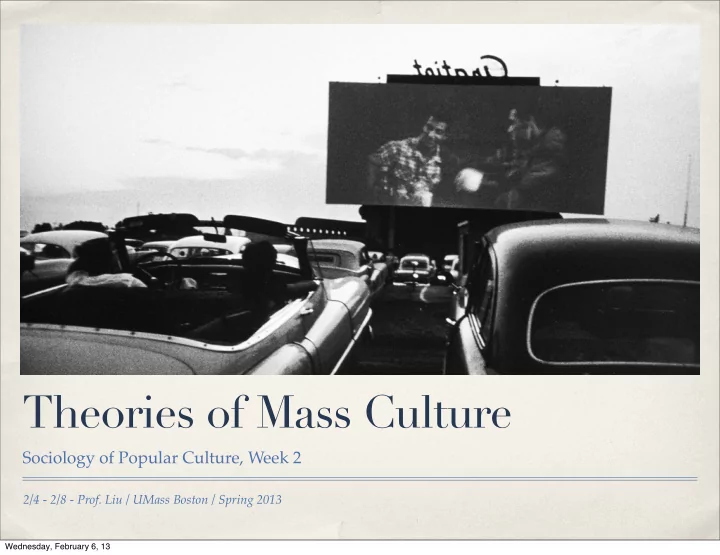

Theories of Mass Culture Sociology of Popular Culture, Week 2 2/4 - 2/8 - Prof. Liu / UMass Boston / Spring 2013 Wednesday, February 6, 13
Mass culture ✤ Mass production: Fordism ✤ Mass consumption ✤ Mechanical reproduction ✤ “The masses” ✤ Mass media Wednesday, February 6, 13
Georg Simmel ✤ Culture is “the cultivation of individuals through the agency of external forms which have been objectified in the course of history.” ✤ The Metropolis and Mental Life” (1903) ✤ Traditional rural/small town: emotional, subjective relationships, steady customs ✤ Modern urban/metropolitan centers: rational, objective relationships, constant change, money economy Wednesday, February 6, 13
Objective culture ✤ Money economy reduces quality and individuality of things to quantitative value (exchange value) ✤ Punctuality, calculation, exactitude-->intellectual relationships ✤ Large crowds-->emotional distance ✤ Rapid stimuli, change--> blasé outlook ✤ Wednesday, February 6, 13
The individual and objective culture ✤ Individual becomes single cog in vast structure of forces ✤ Loneliness, alienation ✤ Struggle to assert individuality, distinctness ✤ Freedom from small town social bonds, traditions, conformity Wednesday, February 6, 13
Modern Times (1936) ✤ Chaplin’s most popular film ✤ Commentary on modern, industrialized culture, Great Depression ✤ Assembly line work ✤ Slapstick comedy Wednesday, February 6, 13
Cinema as popular culture ✤ Affordable entertainment ✤ Films do not directly reflect objective culture, mass production ✤ Escapism ✤ Expressive of utopian desires: need for different, better social order (Richard Dyer, “Entertainment and Utopia”) Wednesday, February 6, 13
Modern Times ✤ State of workers’ rights (lack of) ✤ Prison system ✤ Dehumanization in factory assembly line work ✤ Struggle to survive, poverty, Great Depression ✤ Increased efficiency, productivity is driving goal of factory owner, to the detriment of workers. ✤ American Dream of couple in their own house Wednesday, February 6, 13
“A Theory of Mass Culture” (1953) ✤ Dwight Macdonald (1906-1982) ✤ “Kitsch” (German word for mass culture) ✤ Related to but different from high culture and folk art ✤ Historical reasons: political democracy, popular education, technological development Wednesday, February 6, 13
elites high culture mass avant- culture garde artists, the masses folk intellectuals art/culture common people Wednesday, February 6, 13
Mass culture - Dwight Macdonald ✤ Made by elites and ruling classes for the masses ✤ Purpose: profit and maintenance of class rule ✤ Operative in capitalist and communist societies (U.S. and U.S.S.R.) ✤ Capitalism: entertainment ✤ Communism: pedagogy Wednesday, February 6, 13
Gresham’s Law ✤ Bad drives out good ✤ Kitsch competes with good art ✤ Kitsch is more easily understood, accessed, appeals to “lowest common denominator”-->ease of consumption ✤ Kitsch is standardized, large quantities-->ease of production ✤ Kitsch “predigests art for the spectators and spares him the effort” (Clement Greenberg). Wednesday, February 6, 13
Homogenized culture ✤ Dissolves distinctions of class, tradition, taste, value judgments, cultures ✤ Metaphor: homogenized milk ✤ Democratic and non-discriminatory ✤ Ex) Life Magazine Wednesday, February 6, 13
Avant-garde ✤ Intellectual and artistic elite ✤ Tied to cultural and political radicalism (1890-1930) ✤ Removed from mass culture ✤ Ahead of the people ✤ Ex) Picasso, Joyce, Stravinsky Wednesday, February 6, 13
Art and cinema ✤ Macdonald: Chaplin’s films are folk art ✤ Silent cinema: some examples of folk art and avant-garde ✤ Directors as artists: D.W. Griffith ✤ Sound film: rise of formulas ✤ Division of labor, technicians and specialists Wednesday, February 6, 13
The problem of the masses ✤ Conservatives: rebuild traditional class barriers between elites and common people; popular is cheap and vulgar. ✤ Liberals and radicals: masses are duped by makers of kitsch, common people are “noble savages,” need better cultural products. ✤ Macdonald: both views are wrong-->mass culture is not expression of the people but of the masses Wednesday, February 6, 13
Macdonald: the masses ✤ People in the masses do not relate to each other as individuals, members of a community ✤ Abstract, distant, nonhuman relations ✤ “Folk” and community: shared interests, each individual matters and integrated into group ✤ Mass society: large quantities, undifferentiated and loosely structured, cohere along least common denominator ✤ The public Wednesday, February 6, 13
Future of high culture: dark ✤ Blurring of class lines, unstable cultural traditions, increased facilities for making kitsch ✤ Decline of avant-garde ✤ Fragmented intelligentsia ✤ “Brain workers” are specialists Wednesday, February 6, 13
Future of mass culture: darker ✤ Trivial and comfortable products ✤ Lower audience expectations ✤ Chicken or the egg question: mass product or audience? ✤ Formulaic: popular music and Hollywood films ✤ Folk art lacks cultural roots and intellectual toughness Wednesday, February 6, 13
Recommend
More recommend